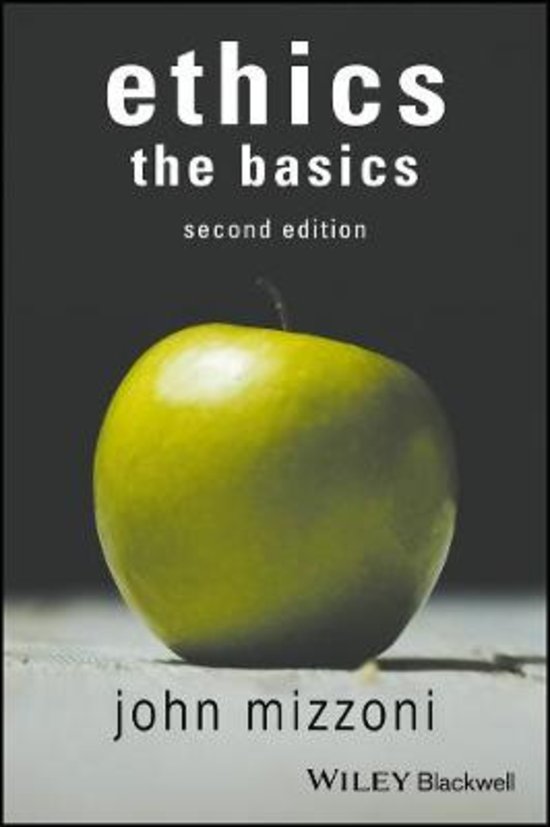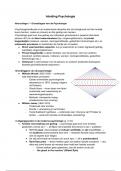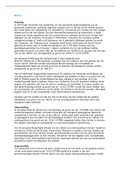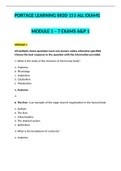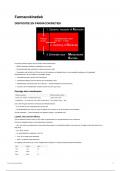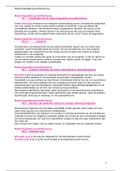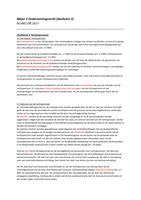Lecture 1: What would you do?, ethics, applied or political
1. Why ethics?
Because of personal and professional reasons. We are gonna make explicit moral questions.
2. What is ethics?
Ethics/morality distinction
♦ Common use of the distinction
- Morality: the domain of moral relations between individuals
- Ethics: The discipline that studies morality (ethikos) = expressing morality,
character. This refers to something that expresses morality. Ethics is the discipline
that formulates what ethics is about.
♦ Rare use of the distinction (Ex. Kant/Dworkin)
- Morality: the domain of moral relations between different individuals
- Ethics: the domain of moral relations between an individual and himself
They use ethics to refer to the sector of morality and the moral relations that an individual
has towards himself or others. Morality is about the standards how we dictate to other
people. Ethics is about the moral relations between himself or herself.
We are going to focus on the first use of morality
Morality: the domain of moral norms and moral judgements based on moral norms (Elster)
Moral norms: norms whose existence/validity does not depend on other people’s presence.
These are more binding than social norms, so the difference is that social norms depend on
their very existence and on their validity on other people believing and acting on those social
norms.
Social norms are norms that have to been respected by other individuals, thus the
existence/validity depends on/is mediated by other people’s presence. Social norms can only
exist if others believe that they exist and acts on those beliefs.
Social norms are contingent on other people´s belief, but moral norms are unconditional,
they only exist independent of other people. The reason we obey social norms is that other
also do it. Moral norms impose by themselves a validity. The way you obey the moral norm
has a technical dimension.
1
,Unconditionally of moral norms
To make the point of the unconditionally, so that they are not mediated by other people.
When you fail to believe on moral demands, then the problem is that you didn’t live up to
the moral norms. People are in contact with moral norms, unlike social norms which
depends on other people.
3. A thought experiment (Types of ethical theories/reasoning)
1. Applied ethics (one morality is structured by one idea, (duty, consequences or virtue) and
then you do applied ethics to practical issues). All 3 forms have an own idea how to deal with
the question of the railtrack.
1.1 Deontological ethics: the morality of an action resides in its conformity with duty.
The criteria of morality is the conformity of that action with duty. If the action is not
conform with the duty then the action is prohibited. So duty based ethics. It is against
or duty as man to push a man.
1.2 Consequentialist ethics: the morality of an action resides in its consequences (i.e.
utilitarianism; reduce the amount of suffering and increase the amount of happiness)
What justifies actions are their consequences. A reason for pulling a switch or
pushing a man cannot be universalised for people acting in the same way, then it is
not morally justified.
1.3 Virtue ethics: the morality of an action resides in what contributes to virtuous
disposition/character. Thus a personal disposition. If a virtuous person did not pull
the switch in the case of the friend, then it is a sign of friendliness. This is a form of
ethics that pays attention to the circumstances of a situation. There is a relative
moral difference in the case of the stranger and the friend, and that difference is the
virtue on the basis of which you can make a difference (morality of an action is
residing inside someone’s character)
2. Political ethics: The morality of an action is subject to disagreement and revision. They
disagree on what the overall meaning is of ethics. (Thompson). They think that coherence
and non-contradiction is not necessarily a form of morality.
3. Relevance of the problem
<> Moral dilemmas and public policy choices – diversion of threats. So sacrifice few for the
many
1. Forced landing
2. Quarantine of a few people
3. Ticking time bomb
2
, 4. Ethical vocabulary
- Thought experiment: imaginary scenario that elicits morally relevant choices/beliefs
- Moral dilemma; an undesirable moral choice, which both options are undesirable. From a
moral point both situations are problematic.
- Moral reasons (Prima facie; an apparent reason, but might not be a reason after all/Pro
tanto; a defeasible reason, but there might be a stronger reason than your pro tanto
reason): Typically these are to be considerations that point to a moral norm. Reasons are
devices which connects your actions to values (whatever they are).
- Moral principes: general moral reasons, they apply across sets of actions
The basic idea is not from something is, but from how something ought to be.
• Naturalistic fallacy: Infering from an natural property to a moral property of that
thing you are talking about. You cannot validly infer from the natural properties of X
to the moral properties of X. Morality cannot be reduced to things that are simply
natural. In particular, how X is naturally does not tell you whether it is morally good.
Upshot you cannot reduce moral properties to non-moral properties
5. Essentially contested concepts
This article is not for the exam, just simply to talk about the kind of debates. The idea in the
article is that among the evaluative concepts (whether something is good or bad, there is a
class of concepts within the normative concepts). contested concepts, people don’t agree
on much when they talk about it. I.e. just/unjust or right/wrong. People were taking the
concepts seriously, but they disagree on how to interpret these concepts. There should be
an evaluations of policy, institutions etc., but they disagree on the general idea of i.e.
right/wrong. We agree on the general idea of right or wrong, but we disagree on the
specifications of what right or wrong means. Utilitariasm, etc disagree.
Duty = ontologist
Paper is critical discussion
3
1. Why ethics?
Because of personal and professional reasons. We are gonna make explicit moral questions.
2. What is ethics?
Ethics/morality distinction
♦ Common use of the distinction
- Morality: the domain of moral relations between individuals
- Ethics: The discipline that studies morality (ethikos) = expressing morality,
character. This refers to something that expresses morality. Ethics is the discipline
that formulates what ethics is about.
♦ Rare use of the distinction (Ex. Kant/Dworkin)
- Morality: the domain of moral relations between different individuals
- Ethics: the domain of moral relations between an individual and himself
They use ethics to refer to the sector of morality and the moral relations that an individual
has towards himself or others. Morality is about the standards how we dictate to other
people. Ethics is about the moral relations between himself or herself.
We are going to focus on the first use of morality
Morality: the domain of moral norms and moral judgements based on moral norms (Elster)
Moral norms: norms whose existence/validity does not depend on other people’s presence.
These are more binding than social norms, so the difference is that social norms depend on
their very existence and on their validity on other people believing and acting on those social
norms.
Social norms are norms that have to been respected by other individuals, thus the
existence/validity depends on/is mediated by other people’s presence. Social norms can only
exist if others believe that they exist and acts on those beliefs.
Social norms are contingent on other people´s belief, but moral norms are unconditional,
they only exist independent of other people. The reason we obey social norms is that other
also do it. Moral norms impose by themselves a validity. The way you obey the moral norm
has a technical dimension.
1
,Unconditionally of moral norms
To make the point of the unconditionally, so that they are not mediated by other people.
When you fail to believe on moral demands, then the problem is that you didn’t live up to
the moral norms. People are in contact with moral norms, unlike social norms which
depends on other people.
3. A thought experiment (Types of ethical theories/reasoning)
1. Applied ethics (one morality is structured by one idea, (duty, consequences or virtue) and
then you do applied ethics to practical issues). All 3 forms have an own idea how to deal with
the question of the railtrack.
1.1 Deontological ethics: the morality of an action resides in its conformity with duty.
The criteria of morality is the conformity of that action with duty. If the action is not
conform with the duty then the action is prohibited. So duty based ethics. It is against
or duty as man to push a man.
1.2 Consequentialist ethics: the morality of an action resides in its consequences (i.e.
utilitarianism; reduce the amount of suffering and increase the amount of happiness)
What justifies actions are their consequences. A reason for pulling a switch or
pushing a man cannot be universalised for people acting in the same way, then it is
not morally justified.
1.3 Virtue ethics: the morality of an action resides in what contributes to virtuous
disposition/character. Thus a personal disposition. If a virtuous person did not pull
the switch in the case of the friend, then it is a sign of friendliness. This is a form of
ethics that pays attention to the circumstances of a situation. There is a relative
moral difference in the case of the stranger and the friend, and that difference is the
virtue on the basis of which you can make a difference (morality of an action is
residing inside someone’s character)
2. Political ethics: The morality of an action is subject to disagreement and revision. They
disagree on what the overall meaning is of ethics. (Thompson). They think that coherence
and non-contradiction is not necessarily a form of morality.
3. Relevance of the problem
<> Moral dilemmas and public policy choices – diversion of threats. So sacrifice few for the
many
1. Forced landing
2. Quarantine of a few people
3. Ticking time bomb
2
, 4. Ethical vocabulary
- Thought experiment: imaginary scenario that elicits morally relevant choices/beliefs
- Moral dilemma; an undesirable moral choice, which both options are undesirable. From a
moral point both situations are problematic.
- Moral reasons (Prima facie; an apparent reason, but might not be a reason after all/Pro
tanto; a defeasible reason, but there might be a stronger reason than your pro tanto
reason): Typically these are to be considerations that point to a moral norm. Reasons are
devices which connects your actions to values (whatever they are).
- Moral principes: general moral reasons, they apply across sets of actions
The basic idea is not from something is, but from how something ought to be.
• Naturalistic fallacy: Infering from an natural property to a moral property of that
thing you are talking about. You cannot validly infer from the natural properties of X
to the moral properties of X. Morality cannot be reduced to things that are simply
natural. In particular, how X is naturally does not tell you whether it is morally good.
Upshot you cannot reduce moral properties to non-moral properties
5. Essentially contested concepts
This article is not for the exam, just simply to talk about the kind of debates. The idea in the
article is that among the evaluative concepts (whether something is good or bad, there is a
class of concepts within the normative concepts). contested concepts, people don’t agree
on much when they talk about it. I.e. just/unjust or right/wrong. People were taking the
concepts seriously, but they disagree on how to interpret these concepts. There should be
an evaluations of policy, institutions etc., but they disagree on the general idea of i.e.
right/wrong. We agree on the general idea of right or wrong, but we disagree on the
specifications of what right or wrong means. Utilitariasm, etc disagree.
Duty = ontologist
Paper is critical discussion
3


